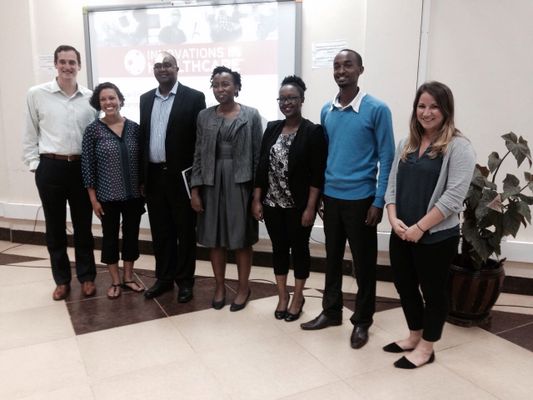The morning of July 9th started off like any other at one of Kenya’s top universities. Students flowed in every direction across the expansive main campus of Kenyatta University (KU) in Kahawa, just 20 kilometers north of Nairobi.
A buzz radiated from students chatting anxiously of upcoming exams and for some, the soon-to-be graduating seniors, hopes and uncertainties of post-university life. But for a multidisciplinary subset of 75 students from the Schools of Business, Economics, Applied Sciences and Engineering & Technology Schools, the morning of July 9th offered a brief retreat from exam prep to stoke a shared passion: social impact through entrepreneurship. Innovations in Healthcare/SEAD staff and students, in partnership with the Chandaria Business Innovation and Incubation Centre at KU, were on campus to engage with Kenyatta students about social entrepreneurship. Workshop topics catered to students all across the social entrepreneurship experience spectrum. We gave an overview of social entrepreneurship, tips on idea generation and case studies of successful social entrepreneurs. For those more seasoned, including a host of innovators currently steeped in the Chandaria incubation process, specific tools and resources were presented to help entrepreneurs evaluate their business models and identify potential blind-spots that could stall capital procurement down the road.
The session was energized with dialogue flowing from the students who clearly demonstrated an aptitude for entrepreneurship geared towards improving their communities. Student ideas, born from personal experience, ranged from biomedical implants and diagnostic medical devices to rural/urban supply chain transformation to community building through unifying university students and knowledge sharing. Students did not shy away from asking the questions most pressing to their business idea as they peppered the Chandaria and Innovations in Healthcare/SEAD teams on subjects like capital mobilization, creativity around sustaining revenue streams, mentorship and networking channels, and transitioning from prototype to a market-ready product or service. The workshop concluded with a breakout session that encouraged student sub-teams to pressure test each other’s ideas by walking the idea through each component in the Social Business Model Canvas. The students' commitment to improving their ideas was evident and inspiring as they eagerly presented their enhanced business models back to the broader group. For students contemplating concepts like “value proposition” and “intervention type” for the first time, one student summarized the session’s benefit: “I’ve always known I’d one day start a business but didn’t know where to start. This workshop has given me a starting point.”
As the event came to a close, departing students were provided a resource guide that detailed East Africa Social Entrepreneur success stories and a social entrepreneurship reading list to support the students in their journey. For those students (who may be reading this post) with an insatiable desire for more perspectives on social entrepreneurship, here are some more resources to check out:
- Health Market Innovations
- Stanford Social Innovation Review
- Aspen Network of Development Entrepreneurs
- Health Systems Hub
The partnership between Chandaria Business Innovation and Incubation Centre and Innovations in Healthcare/SEAD has concluded but the broader conversation is just getting started. We were encouraged to see that the training and tools we gained from Duke spans borders and cultures. The opportunity to teach this workshop was energizing and rewarding. One student recapped a workshop theme like this, “Social entrepreneurs pair a purpose driven life with hard skills to make a business work.” That is a winning formula, indeed, and the passion and promise displayed by these 75 students was resounding evidence that a social entrepreneurial spirit is thriving at Kenyatta University.

